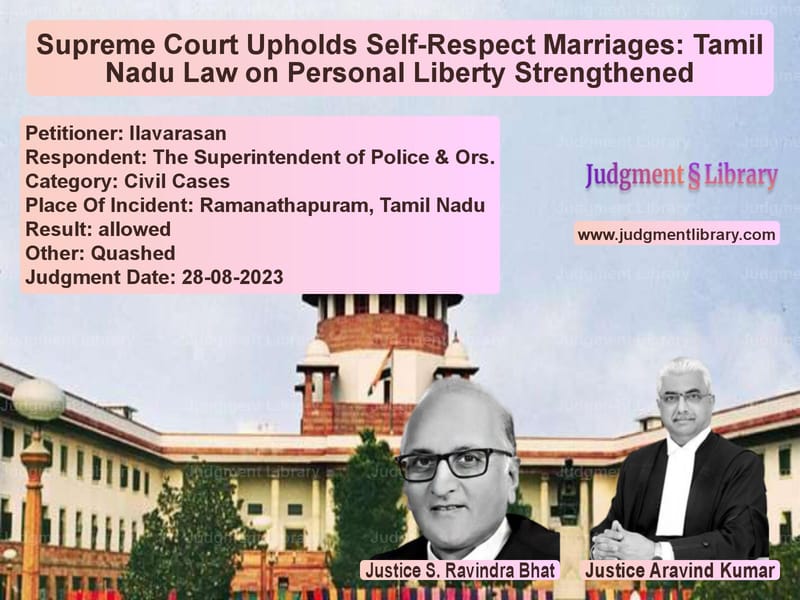Supreme Court Upholds Self-Respect Marriages: Tamil Nadu Law on Personal Liberty Strengthened
The Supreme Court of India, in the landmark case of Ilavarasan v. The Superintendent of Police & Ors., reaffirmed the legal sanctity of self-respect marriages under Section 7A of the Hindu Marriage Act, 1955 (as amended by the Tamil Nadu government). The Court held that marriages solemnized without the presence of a priest or traditional religious customs are valid under Tamil Nadu law. This ruling also emphasized personal liberty in marriage and quashed the High Court’s order that questioned the legality of self-respect marriages conducted without a public declaration.
Background of the Case
The petitioner, Ilavarasan, filed a habeas corpus petition in the Madras High Court after his wife, Mathithra, was allegedly detained and coerced into another marriage. He argued that their self-respect marriage, solemnized without religious rituals but with mutual consent, was legally binding under Section 7A of the Hindu Marriage Act.
The key facts of the case are:
- March 2023: Ilavarasan and Mathithra were married in a self-respect ceremony, which does not require a priest or religious formalities under Tamil Nadu law.
- April 2023: Mathithra’s family allegedly took her away, forcibly detaining her at their home.
- April 15, 2023: She was allegedly coerced into another marriage.
- May 2023: Ilavarasan filed a habeas corpus petition in the Madras High Court, seeking her release.
- May 2023: The High Court dismissed the petition, questioning the validity of a self-respect marriage without a public announcement.
- June 2023: Ilavarasan approached the Supreme Court, challenging the High Court’s decision.
- August 28, 2023: The Supreme Court quashed the High Court’s ruling and upheld the legality of self-respect marriages.
Legal Issues Considered
The Supreme Court analyzed the following issues:
- Whether self-respect marriages require a public declaration or can be legally binding with just mutual consent.
- Whether the Madras High Court erred in dismissing the habeas corpus petition.
- Whether personal liberty and choice in marriage were violated by family intervention.
Arguments by the Petitioner
Ilavarasan argued:
- The marriage was legal under Section 7A of the Hindu Marriage Act, which Tamil Nadu had amended to recognize self-respect marriages.
- His wife was forcibly detained and coerced into another marriage, violating her right to choose a partner.
- The High Court had wrongly imposed an extra requirement of a public announcement, which is not required under Tamil Nadu law.
Arguments by the Respondents
Mathithra’s family argued:
- The marriage was invalid because it lacked religious solemnization.
- Self-respect marriages should require public announcement to ensure legitimacy.
- The habeas corpus petition was unnecessary since Mathithra was staying with her family willingly.
Supreme Court’s Analysis and Judgment
1. Validity of Self-Respect Marriages
The Supreme Court ruled that self-respect marriages do not require religious ceremonies or public declarations:
“Section 7A of the Hindu Marriage Act does not mandate a priest or religious formalities. The essence of marriage is mutual consent, which was present in this case.”
2. Violation of Personal Liberty
The Court held that Mathithra’s alleged detention violated her fundamental rights under Article 21 of the Constitution:
“The right to marry a person of one’s choice is protected under Article 21. Any interference by family members to coerce a person into another marriage is unconstitutional.”
3. High Court’s Error
The Supreme Court found that the High Court had erred in questioning the validity of the marriage:
“The view that self-respect marriages require public declaration is incorrect and legally unsustainable.”
Supreme Court’s Final Decision
The Supreme Court ruled:
- The self-respect marriage between Ilavarasan and Mathithra is legally valid.
- Mathithra cannot be forced to stay with her family.
- The Tamil Nadu government must ensure protection for individuals opting for self-respect marriages.
- The High Court’s ruling was quashed.
Conclusion
This judgment strengthens legal protections for self-respect marriages and personal liberty, ensuring:
- Self-respect marriages are valid: No religious rituals or public announcements are required.
- Personal liberty in marriage is protected: Forced detentions violate constitutional rights.
- Judicial overreach is checked: Courts cannot impose conditions beyond what the law prescribes.
This ruling upholds the rights of individuals to choose their partners and protects self-respect marriages from unnecessary legal scrutiny.
Petitioner Name: Ilavarasan.Respondent Name: The Superintendent of Police & Ors..Judgment By: Justice S. Ravindra Bhat, Justice Aravind Kumar.Place Of Incident: Ramanathapuram, Tamil Nadu.Judgment Date: 28-08-2023.
Don’t miss out on the full details! Download the complete judgment in PDF format below and gain valuable insights instantly!
Download Judgment: ilavarasan-vs-the-superintendent-o-supreme-court-of-india-judgment-dated-28-08-2023.pdf
Directly Download Judgment: Directly download this Judgment
See all petitions in Fundamental Rights
See all petitions in Public Interest Litigation
See all petitions in Judgment by S Ravindra Bhat
See all petitions in Judgment by Aravind Kumar
See all petitions in allowed
See all petitions in Quashed
See all petitions in supreme court of India judgments August 2023
See all petitions in 2023 judgments
See all posts in Civil Cases Category
See all allowed petitions in Civil Cases Category
See all Dismissed petitions in Civil Cases Category
See all partially allowed petitions in Civil Cases Category







